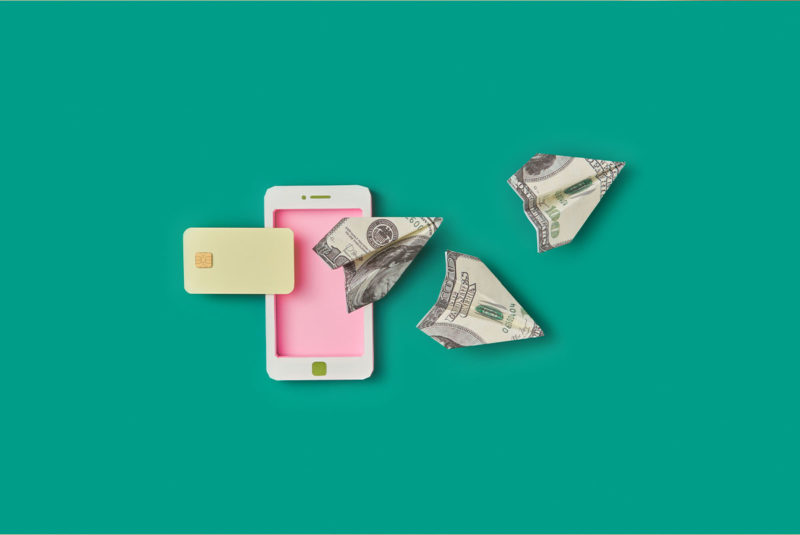Student credit cards are designed for students – meaning people with limited or no credit history, and relatively low income. But before you get one, it’s important to understand how credit cards impact your credit history. If you use a credit card irresponsibly you could end up with lots of expensive debt, negative items on your credit reports, or both.
Best Pick For: Flexible Bonus Categories
Bank of America Customized Cash Rewards™ Credit Card for Students
The Bank of America Customized Cash Rewards™ Credit Card for Students is one of the most rewarding cards for students. It has a 3% category you can customize to your liking each month.
With this flexible card you can adjust your bonus category each month to fit your expected spending. So if you’re going on a trip next month, for example, you could use the travel category to get 3% back on your airfare and hotel bookings, and even a car rental. Then, when the new month begins, you can switch your category to gas to help fuel your adventure.
Best Pick For: Rotating Bonus Categories
Discover it® Student Cash Back
If you make a variety of purchases throughout the year (and who doesn’t?), it’s useful to have a card with a variety of bonus categories.
That’s what you’ll get with the Discover it® Student Cash Back, which is probably the most rewarding student card available. Its 5% cash back categories rotate throughout the year, covering some pretty common student purchases. If you want a simple but rewarding card with excellent customer support, this could be the one for you.
Discover’s Cashback Match means you’ll be earning a cash back equivalent of 10% in the bonus categories for the first year, and 2% for everything else. Those are excellent rates, even for non-student cards.
The Discover it Student is just as rewarding as the non-student version, the Discover it® Cash Back, although some of the other terms are different.
Best Pick For: Dining Out and Eating In
Capital One SavorOne Student Cash Rewards Credit Card
With great rates on a selection of handy categories, the Capital One SavorOne Student Cash Rewards Credit Card could be your go-to card for almost everything. And you even get a chance for a higher credit limit in as little as six months, giving you some more spending power and making it easier to keep your credit utilization low.
Best Pick For: Traveling Abroad
Bank of America Travel Rewards® Credit Card for Students
Heading out for an exciting adventure in another country? Wouldn’t it be nice to have a convenient payment method that won’t cost you extra for using it outside the U.S?
The Bank of America Travel Rewards® Credit Card for Students checks that box by having no foreign transaction fee, so that helps keep expenses down. You’ll also get a solid rate on purchases through the BofA Travel Center, so try to book through that service when possible.
This card also comes with chip-and-PIN capability, making it more useful at certain terminals and automated kiosks outside the U.S. You can easily set or change your PIN online. If you’ll be traveling to foreign countries it’s often a good idea to have a PIN card in your wallet.
Best Pick For: Buying Gas
Discover it® Student chrome
Gas and dining are pretty popular categories on student cards, but the Discover it® Student chrome provides the best consistent rewards for those purchases.
This card is great in the first year, providing a 4% cash back equivalent on gas and dining, and 2% back for everything else. After that it drops to a more tame rewards program.
So, you won’t be earning a ton of cash back, which is fairly typical for student cards. But in your first year you’ll get very competitive rates for gas and dining, equal to some of the best non-student cash back cards.
Best Pick For: Flat-Rate Cash Back
Capital One Quicksilver Rewards for Students
Flat-rate credit cards provide the same rate for every purchase, making them excellent choices to fill in the gaps between the bonus categories of other cards.
You might have cards with good bonus categories for groceries and gas, but what about those random Walmart and corner store purchases? That’s where flat-rate cards come in handy.
The Capital One Quicksilver Rewards for Students is an excellent flat-rate card for students. You’ll be earning as much cash back as many non-student flat-rate cards, like the Chase Freedom Unlimited®.
The SavorOne Rewards for Students may also provide a higher credit line after your first six months. That extra spending capacity should be very useful on a student card, which usually comes with a fairly low credit limit.
Best Pick For: Easy Acceptance
Petal® 2 Cash Back, No Fees Visa® Card
With no fees at all aside from potential interest charges, the Petal® 2 Cash Back, No Fees Visa® Card issued by Web Bank is a great first credit card.
Most card issuers will check your credit history when you apply – but what if you don’t have any credit history yet, and no credit scores? The Petal card might be for you.
If you have no established credit, Petal will ask to connect to your bank account to check your financial situation, as a way to judge your riskiness as a borrower. This gives you another avenue for approval if you don’t have any credit. If you do have some credit built up, Petal will likely run a hard inquiry to check it, like most issuers do.
Best Pick For: International Students, No SSN Required
Deserve Edu Mastercard
The Deserve® EDU Mastercard for Students is good for international students because it doesn’t require a Social Security number to apply. Deserve will also check more than the usual credit history factors when you apply, like your education and future employability, giving you a better chance of approval than most cards.
So, if you’re arriving in the U.S. to study and you don’t have an SSN, this may be one of the few cards available to you. International students will need to provide proof of a U.S. bank account and copies of their student visas, passport IDs, and school documents.
Take note that Deserve will need to connect to your bank account to verify your balance. If you have privacy or security concerns this might worry you. But it seems reasonable because Deserve bases its decision on more than the typical credit approval factors.
When you visit MoneyTips, we want you to know that you can trust what’s in front of you. We are an authoritative source of accurate and relevant financial guidance. When MoneyTips content contains a link to partner or sponsor affiliated content, we’ll clearly indicate where that happens. Any opinions, analyses, reviews or recommendations expressed in our content are of the author alone, and have not been reviewed, approved or otherwise endorsed by the advertiser.
We make every effort to provide up-to-date information; however, we do not guarantee the accuracy of the information presented. Consumers should verify terms and conditions with the institution providing the products. Some articles may contain sponsored content, content about affiliated entities or content about clients in the network. While reasonable efforts are made to maintain accurate information, the information is presented without warranty.
What Is a Student Credit Card?
A student credit card is simply a credit card designed for college students. These cards usually require you to be an active student when you apply (the Journey Student Rewards from Capital One is an exception – you don’t need to be a student to qualify).
Students typically have limited or no credit, because they haven’t yet established a credit history. As such, student cards typically come with few rewards or benefits, and low credit limits.
Other than that, they’re pretty similar to regular credit cards.
What Is the Best Student Credit Card?
A variety of student credit cards are available, each designed for different purposes. Our favorite student cards include:
- Discover it® Student Cash Back, if you’re looking for cash back rewards in multiple categories
- Bank of America Customized Cash Rewards™ Credit Card for Students, if you’ll be traveling within the U.S.
- Deserve Edu Mastercard, if you’re an international student without an SSN
Do Student Credit Cards Build Credit?
Yes, student credit cards can help you build credit like most other credit cards – as long as the issuer reports the card activity to the credit bureaus (Equifax, Experian, and TransUnion).
Most credit card issuers (including the major credit card issuers, like Chase, Citi, and Discover) report card activity to the bureaus, so you typically have nothing to worry about.
In some cases, smaller, less established credit card companies may not report activity to the credit bureaus. But this is rare. Some companies only report activity to one or two of the bureaus, rather than all three. These issuers can still help you build credit, but the effects won’t be as robust.
Commit to using your credit cards responsibly to help improve your credit scores. In time, as your scores go up, you may qualify for better rewards cards with valuable perks.
How Old Do I Have to Be to Get a Student Credit Card?
You have to be at least 18 to apply for a student credit card.
If you’re younger than 21, you’ll need to meet more stringent criteria to prove you can pay your bills each month. When the issuer asks for information about how much money you make, you’ll only be able to report your own independent income (and most card issuers don’t allow co-signers).
Once you turn 21 you can include your total household income. Since that can include your spouse’s income, using your total household income can make it easier to qualify.
If you’re under 18, you can explore becoming an authorized user on a parent’s credit card. Authorized users can get their own copy of someone else’s credit card, but keep in mind that only the primary cardholder has full legal responsibility for paying the bill.
What Will Happen to My Student Card After I Graduate?
It depends on your card issuer. Your typical options will be:
- Upgrade to a non-student credit card
- Continue using the same card
Contact your card issuer to see what your options are. We recommend upgrading to a non-student credit card if possible, because you’ll probably get better rewards and benefits. You might be awarded a higher credit limit whether you keep the same card or upgrade, since you may be entering the job market and earning more money.
We usually suggest not closing your student card after you graduate, unless it has an annual fee. Keeping your cards open can help improve your credit scores by reducing your credit utilization and increasing your overall age of accounts, among other effects.
Expert Q&A
Q1) What are the best features to look for in student credit cards?
Suzan Pavlis, Distinguished Lecturer, Haslam School of Business, University of Tennessee Knoxville
Low interest rate if you’re unable to pay it off every month and no annual fee. Any perks, like cash back, points for travel, etc.
Ali Nejadmalayeri, Associate Professor of Finance, University of Wyoming
First and foremost, a credit card is a loan, not your money. So, you need to pay it back with interest. So, the first thing is to search for a low interest rate card that doesn’t jump after the introductory rate period. Or, at least introductory rates that last a while. But since you will be using it forever, then my preference is to start with low-rate ones. You’ll most likely have months that money is short.
Some offer extra if you use the card for tuition, or room and board. This helps if, for instance, you’re waiting for your financial assistance to come through, and you collect points. If you travel a lot because school is out-of-state, travel perks, gas perks, etc. might be something you want to look into.
Jeffrey Jones, Department Head, Finance and General Business Department, Missouri State University
Those that have no annual fee, and a decent reward/cash-back program.
Amit Sinha, Professor, Finance and Quantitative Methods, Bradley University
One of the features of some of the student credit cards is the cash rewards some of them provide. If students keep their card in good standing and perhaps maintain a good GPA, these cards may provide some cash at the end of the year or semester. This feature, not available for traditional cards, can act as an extra incentive for students to focus on their academics.
Q2) How should a college student plan to use a student credit card?
Joyce Serido, Ph.D., Associate Professor & Extension Specialist, University of Minnesota
When used responsibly, a credit card is a useful financial tool. Using a credit card to make purchases, especially online purchases, provides both the convenience of a debit card as well as extra security and protection against fraud and identity theft.
Each time you pay for something with a credit card, you are establishing your credit worthiness, creating a credit history that signals if you are someone who is able to handle their finances responsibly. A good credit history is very important when making major purchases, like a car, or signing a lease for an apartment.
Having a credit card contributes to your financial stability, making it easier to smooth out monthly spending, covering any gaps between when expenses like utilities are due – and when the next paycheck arrives.
And, as your responsibilities increase, credit cards can provide a cushion for dealing with unexpected emergencies, like bicycle or car repairs.
Suzan Pavlis, Department of Finance faculty, University of Tennessee
If you’re responsible enough to pay it off every month, then use it for everything. I check my balance daily and believe in budgeting. I put all my discretionary, variable expenses on my credit card and I have a budget that I adhere to everyday (e.g., $100/day so my balance never exceeds that amount.) However, if you’re not that responsible, only use it for items that you plan to pay off at the end of the month.
Remember, the interest is compounded daily, so if you only pay the minimum amount due, you may actually owe MORE than at the end of the month, even if you’ve paid off partly what you owe. Be responsible. Credit cards are used for convenience and to build your credit history; they’re not to be used to purchase things one can’t afford.
John Sedunov, Associate Professor, Finance & Real Estate, Villanova University
In my view, the best way to use a credit card is to build credit. Don’t use it to buy things you couldn’t otherwise afford. Instead, use the card and pay it off in full every month.
This helps build your credit and enhance your credit score so that when it comes time for larger purchases like a car or a house, you won’t have trouble, and can potentially get better interest rates.
Ali Nejadmalayeri, Associate Professor of Finance, University of Wyoming
The most prudent way to use the card is as a bridge loan that helps to pay for stuff while you are waiting for scholarships, fellowships, and bigger student loans to kick in. But remember, being a good borrower helps build the credit profile which you need for your car purchase, home purchase, etc. Make sure to pay on time. If you can, make the full payment. If not, avoid going over 50% – 60% of your credit limit. These are all hard things to do. I know, I lived it, so I am telling you from my own struggles as well.
Q3) What are some of the dangers that college students should be aware of with student credit cards?
Suzan Pavlis
It’s too easy to overspend. Remember, you need to pay it back eventually. If you can’t trust yourself, don’t use a credit card. Pay with cash.
John Sedunov
Overusing the credit card is a clear danger and is related to what I said about the best way to use the card. Be aware that the card isn’t free money, and that the card will often have quite a high interest rate. It bears repeating that you should do everything you can to not use the card for anything that you couldn’t otherwise afford.
Ali Nejadmalayeri
Again, a credit card is NOT your money. So don’t assume a $5000 credit line means you can fly to Cancun first class and have a once-in-a-life-time Spring break. Do that and it will break you. And wreck your financial future.
It is very hard when times are hard to keep up with fully repaying cards. But try your best to keep it clean as often as you can. It’s good for your credit scores and it also gives you a lot of emergency lines of credit.
Q4) Why would you consider a student credit card over a traditional credit card?
Joyce Serido
Although credit cards are a useful and important financial tool, they are a form of borrowing – meaning you have to repay the money. And like many financial tools, it takes some practice to learn how to use credit as a source of financial wellbeing, rather than as a source of financial stress.
Student credit cards are designed to help individuals with limited financial experience learn how to manage credit responsibly.
Student credit cards come with the same advantages of a regular credit card but they typically have lower credit limits, making it more difficult to over-borrow and accumulate a lot of debt.
Suzan Pavlis
For perks, and to build your credit history.
John Sedunov
You may consider this option if you don’t have a long or strong credit history. This may be the only option you have to start building credit and setting your future self up for success.
Ali Nejadmalayeri
It really depends on your circumstances and what the card offers: rates, no-late fee, points for things you do (tuition, room, board, etc.). If the card is good, it stands out for things that matters greatly for a student. A card that offers points for air travel is probably not a good one for a student who is stuck in a dorm room, working many hours, is at the library and has limited financial assistance. You probably need that card when you get your first job as a sales-rep for a pharmaceutical company!



